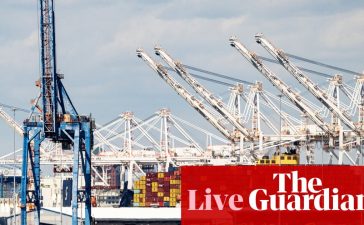Next has rung up £1bn in annual profits for the first time but warned of growing risks to the UK economy, saying big business could not afford to finance “excessive regulation” and government debt.
The retailer said pre-tax profits rose 10% to just over £1bn in the year to January after sales increased 8.2% to £6.3bn, led by strong overseas growth and sales of other brands.
Simon Wolfson, the chief executive of Next, said he now expected to make almost £1.07bn next year, £20m more than previously forecast, as he said the first eight weeks of the new financial year had been “ahead of our expectations”.
The group now predicts that sales in the first half of the year will rise by 6.5%, up from previous expectations of 3.5%, as it reiterated plans to increase prices for shoppers by 1% to help pay for tax changes made in last October’s budget.
Wolfson, who is a Conservative peer, said: “We are as positive about the company today as we were [a year ago], albeit in an environment where the risks to the wider UK economy are growing.
“We expect the UK tax rises in April to weaken the UK employment market and negatively impact consumer confidence as the year progresses.”
Next said it expected new technology in its warehouses to help offset the rising cost of labour from higher national insurance and minimum wage costs.
The government’s changes to national insurance and the increase in the legal minimum wage are expected to add £67m to costs and a new packaging tax to add £6m. However, Next said this would be partly offset by cost savings including running its shops and warehouses more efficiently, cheaper electricity and £13m from increasing prices.
Wolfson warned that the £1bn profit did not mean that the retailer’s shareholders “can afford to pay for Next’s unnecessary expenses” and that “big business was not “a few very rich people with ‘broad shoulders’; shoulders that can afford to take on the burden of paying for excessive regulation and government financing”.
He said in a lengthy statement: “Policymakers should not allow themselves to believe that burdening ‘big’ business does not impact the lives of millions of ‘ordinary’ people: it does – consumers through higher prices, workers through fewer jobs, and savers through lower pension income.”
Wolfson’s comments came as Next revealed that its own-brand sales in the UK were flat as sales fell in stores but increased online. The brand expanded overseas but most of the growth came from other brands Next now owns, such as FatFace and Reiss, and third-party brands that it sells online.
Next said it had not found any new brands it wanted to acquire during the year and had decided to offer an online warehousing logistics service to help use up spare capacity in its warehouses.
Next was created in 1982, after the men’s ready-to-wear suiting chain Hepworths, founded in 1864 by the Leeds tailor Joseph Hepworth, bought the womenswear chain Kendall & Sons and set about reinventing it.
The group, which has more than 400 shops, plans to open 10 stores this year and close nine, increasing its total space for the first time in some years. Last year the group closed one store.
Shares in Next rose almost 7% on Thursday morning as City analysts said the retailer’s improved online offering, including more brands and improved delivery services, was helping it take share from online specialists such as Asos.
David Hughes, a retail analyst at Shore Capital, said: “Next continues to defy gravity with its performance.”









